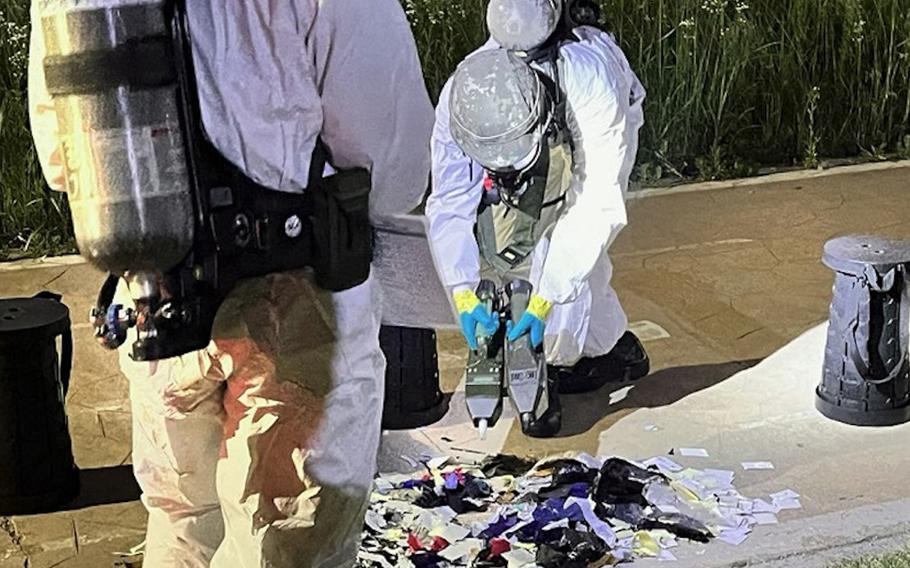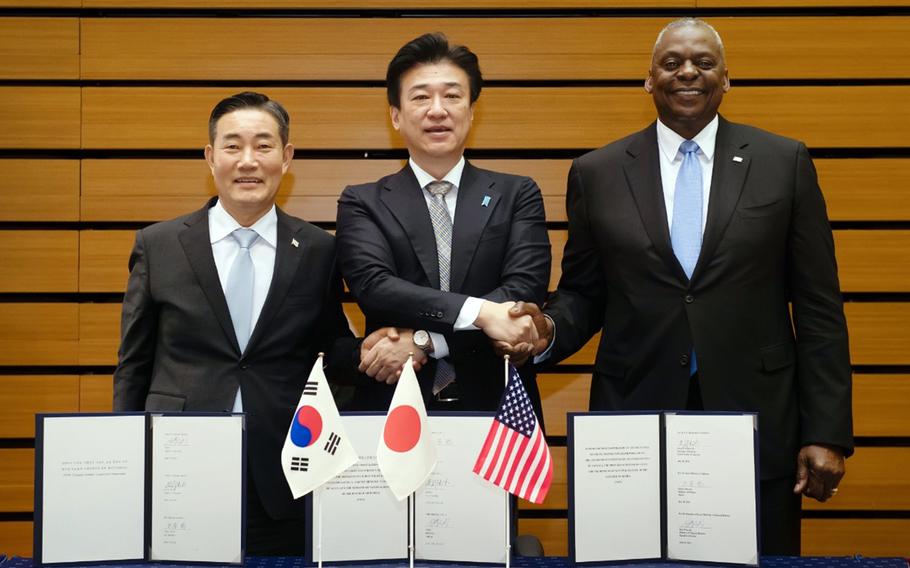
South Korean troops inspect trash carried by a balloon from North Korea to Seoul, South Korea, June 1, 2024. (South Korean Joint Chiefs of Staff)
SEOUL, South Korea — Defense Secretary Lloyd Austin and South Korean Defense Minister Shin Won-sik on Sunday urged North Korea to immediately stop sending balloons carrying trash across its southern border.
The two also agreed to work closer with their Japanese counterpart to curb the communist regime’s provocations.
During a meeting with Austin in Tokyo on Sunday, Shin called North Korea’s practice of sending balloons to the South a “clear violation” of the Korean armistice agreement, according to a news release from the Ministry of National Defense that day.
“The two leaders strongly urged North Korea to immediately cease these provocative acts,” a separate Defense Department news release said Sunday.
The 1953 armistice between the U.N. Command, North Korea and China established air and maritime borders and was meant to cease hostilities from the three-year Korean War.
North Korea has floated thousands of balloons carrying household trash across its border since May and most recently sent roughly 500 balloons on Wednesday. At least two landed on the South Korean presidential compound and on the U.S. Army’s Yongsan Garrison in Seoul.
Pyongyang claims its balloons are being sent in retaliation against South Korean activists who send balloons carrying humanitarian aid and pro-South Korean propaganda across the northern border.
Austin and Shin were joined by Japanese Defense Minister Kihara Minoru in Tokyo on Sunday for the inaugural Trilateral Ministerial Meeting, where the three signed a memorandum that “institutionalizes” security cooperation, according to the DOD release.
This Trilateral Security Cooperation Framework memorandum ushers in a “new era of trilateral cooperation” through information sharing, military exercises and collaboration on policy matters related to the Korean Peninsula and the Indo-Pacific, the release said.

South Korean Defense Minister Shin Won-sik, left, Japanese Defense Minister Kihara Minoru, center, and Defense Secretary Lloyd Austin pose after signing a memorandum in Tokyo, Sunday, July 28, 2024. (South Korean Ministry of National Defense)
The three leaders intend to hold another ministerial meeting in South Korea next year and in the United States in 2026, the release added.
Those meetings coincided with a U.S.-Japan Security Consultative Committee, or 2+2, that brought Austin and U.S. Secretary of State Antony Blinken face to face in Tokyo with Minoru and Japanese Foreign Affairs Minister Kamikawa Yoko.
In their statement afterward, the four “emphasized the critical importance of deepening cooperation with [South Korea] to maintaining regional peace and stability...”
The statement also mentioned the first new multidomain military exercise carried out this year by the three powers, Freedom Edge, and the creation of a mechanism to share data among the three from North Korean missile launches.
North Korea has fired over a dozen ballistic missiles in eight separate days of testing so far this year. The regime most recently launched a short-range ballistic missile and an unidentified variant off its eastern coast on July 1, according to the South’s military.
Austin reiterated that the U.S.’s commitment to South Korea is “backed by the full range of U.S. capabilities including nuclear, conventional, missile defense and advanced non-nuclear capabilities,” the DOD release states.
These assurances have materialized in the form of visits to South Korea by an assortment of U.S. military assets. In the past month, an Air Force AC-130J Ghostrider gunship drilled for two weeks with South Korea’s air force; the aircraft carrier USS Theodore Roosevelt sailed to Busan, South Korea’s largest port, for a trilateral exercise with warships sent by Seoul and Tokyo.
North Korea’s state-run Korean Central News Agency has condemned the appearances of major U.S. military hardware in and around the peninsula. A KCNA report on June 24 described the Theodore Roosevelt’s visit as a provocative act and warned of “overwhelming” measures against the U.S. and South Korea.